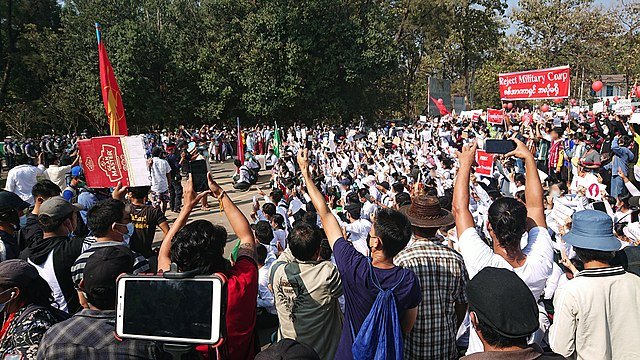U.S. Congress Introduces New Bipartisan BURMA Act Against Myanmar’s Military
Demonstrators in Myanmar protest the coup of February 1, 2021 (Wikimedia Commons)
Eight months after Myanmar’s military took control of the democratic government on February 1, the U.S. Congress has released new legislation in response to the atrocities committed by the junta. The BURMA Act—introduced by House Foreign Affairs Committee Chairman Gregory W. Meeks (D-NY), House Foreign Affairs Asia-Pacific Subcommittee Ranking Member Steve Chabot (R-OH) and Senator Benjamin L. Cardin (D-MD)—aims to “hold responsible the military leaders and others who have ravaged [Myanmar] and committed crimes against humanity.”
The Myanmar military, called the Tatmadaw, seized power on February 1, detaining democratically elected leader Aung San Suu Kyi and other members of her National League for Democracy (NLD) party. The Tatmadaw claims that the NLD party won the November 2020 elections unfairly but has not provided any evidence to support their accusation. Since February, the people of Myanmar have taken to the streets to protest the coup, with tragic results as the Tatmadaw responded with a brutal campaign of violence.
“The Burmese military has refused to cease its violence, release those unjustly detained, or participate in meaningful dialogue with local stakeholders. The United States must do more to support and protect the Burmese people and send a clear signal to the Burmese military,” Chairman Meeks said at the bill’s introduction. Senator Cardin added, “Our bicameral legislation aims to hold responsible the military leaders and others who have ravaged this country [Myanmar]. We stand in solidarity with the people of Burma and condemn the violence that has been perpetrated against them.”
The BURMA Act attempts to hold the military leaders of Myanmar’s junta accountable for the atrocities they have committed since the coup in February. Through sanctions on members of the military, the State Administrative Council, and the many associated conglomerates, the U.S. seeks to target the junta’s sources of revenue which are enabling their atrocities. For example, it completely prohibits the import of precious and semi-precious gemstones from Myanmar into the U.S. In February, the U.S. government blacklisted three gemstone companies—Myanmar Ruby Enterprise, Myanmar Imperial Jade Co. Ltd., and Cancri Gems and Jewellery Co. Ltd.—due to their ties with the military junta.
The bill is not all stick; the carrot of the BURMA Act comes in support for civil society and humanitarian assistance in Myanmar. This includes ensuring the safety of participants in the Civil Disobedience Movement, providing funds to civil society organizations and independent media outlets, assisting individuals and groups conducting democracy training, and financing the COVID-19 response along with resettlement efforts for individuals displaced by conflict.
The bill also calls upon the U.S. to take the initiative to coordinate like-minded allies and regional partners in order to exert pressure on China and Russia to support multilateral action against the military along with imposing a coordinated arms embargo to slow the junta’s supply of high-tech weaponry and drones used to target protestors. Furthermore, the bill continues that the U.S. must increase its efforts to push the United Nations to take more decisive action in regard to Myanmar. Finally, the BURMA Act also emphasizes the necessity of the U.S. to recognize the Myanmar military’s persecution of the Rohingya (Myanmar’s stateless Muslim population) as genocide and support the international justice mechanisms that seek to hold those responsible accountable.
The BURMA Act has the potential to be an important step in bringing the return of democracy to Myanmar. For now, the decision to pass this crucial legislation rests with Congress.

